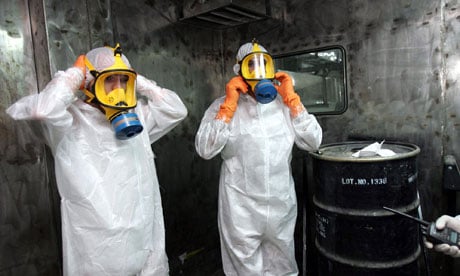
In the coming days, everybody seriously concerned about Iran’s nuclear weapons program will be watching with bated breath the IAEA’s Iran landing page for the agency’s impending report on the Tehran’s efforts to design and build an atomic bomb. President Obama evidently has been briefed on the report and already has in effect commented on it–a most unusual situation–saying it will be essential to keep international pressure on Iran’s leadership.
The IEAE report is expected to flatly contradict a Bush administration intelligence finding that Iran had terminated nuclear weaponization work. That finding always was regarded with considerable skepticism by Germany and France, and by independent nonproliferation specialists.
Why, if the administration had been willing to distort and misread intelligence to justify military action it wanted to take against Iraq, would it not be willing to distort and misread intelligence to justify not taking military action it did not want to take against Iran?
This is not to say, of course, that military action against Iran would have been warranted in the Bush years, or even now. Any military action, whether by the United States, NATO or Israel, would fail to stop Iran’s nuclear program and would inflame anti-western sentiments throughout the world of Islam.
According to reports that have recently appeared in the Israeli press, as well as in Europe and the United States, Netanyahu and Barak may be dead-set on taking immediate military action and are trying to forge a consensus among the country’s national security leaders in favor of that course; Britain and the United States reportedly also are considering action. A recent Israeli missile test and reported Israeli air exercises over Italy may have been done in preparation for a unilateral strike.
Obama is right to be putting the emphasis on continued strong sanctions, which his advisers say have brought Iran’s economy to a virtual standstill, and Israel’s leaders are wrong to be contemplating immediate military action, if indeed they are doing so. On the face of it, the G20 economic summit in Cannes seems destined to spend much of its time figuring out how to ward off Israeli military action against Iran.
If nuclear-armed Israel were to launch a preemptive attack against non-nuclear Iran to stop it from going nuclear, that will not go down well with many millions of people in the world, and not just the world of Islam. Without doubt, Iran’s nuclear efforts represent a serious long-term threat to Israel, but the major powers and the United Nations have been addressing it aggressively. If their efforts ultimately fail and some day Iran is found to be preparing nuclear-armed missiles for a first-strike attack against Israel, then, and no sooner, will preemptive military action be warranted.